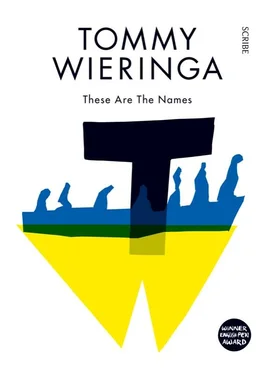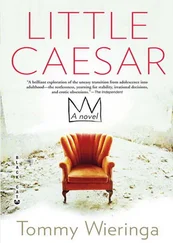‘Do you actually know how to read?’ Beg asked.
‘Of course I can read,’ the boy said without taking his eyes off the page.
Beg went to the window. The park lay in white innocence at his feet. It was growing dark; the shadows were leaving their hiding places. Yellow light fell from the windows onto the snow in the garden. The trees stood white and heavy, taking a time-out. From behind him, now and then, came the sound of a page being turned; the rustling of paper wings. Later he would go visit the rabbi in his consecrated den, amid the moulding relics, and burden him with the things that were troubling his heart.
It looked as though nobody was lying beneath the taut sheet. There were dark rings under her eyes. Every gasp of breath sounded as though she was surfacing from the deep. Beg shivered involuntarily. She had gone to the very limit for the child she was carrying, and now she was going to die beneath that sheet. And she knew it; Beg recognised the look of the animal that senses its life slipping away. Despair and resignation flow like layers of cold and warm water in a single stream.
‘My son,’ she says, ‘where is he?’
He nods. ‘I’ll ask them to bring him.’
He goes back out into the hall. In the distance he sees a nurse, and he calls to her. She presses a finger to her lips in warning. He gestures to her, tells her to get the child.
‘We can’t …’
Beg shakes his head. ‘You have to. Now.’
‘The baby’s premature,’ the nurse says. ‘Seven or eight weeks too early! It’s very vulnerable.’
‘I’m sorry, but that’s the way it is.’
‘Then it’s your responsibility,’ the nurse says, her mouth as sharp as paper.
A few minutes later, the baby is brought in, wrapped in a cotton cloth, only its little head sticking out like a doll’s — a waxen, pale little face, black hair in brush strokes against its scalp. It looks as though it hasn’t opened its eyes yet. Long, syrupy tears slide down the mother’s cheeks. She rolls slowly onto her side and takes the bundle in her arms.
Beg stays in the room with mother and child, deeply aware of his heavy, indiscreet presence. The woman makes quiet, soothing sounds at the impassive baby. Outside of this union, nothing exists. Beg averts her eyes as she bares her breasts, wrinkled sags of skin. She raises a nipple to the child’s mouth. The lips do not part; the baby is asleep. She wrings the nipple between his lips. Now, led by one of the first assignments given him by nature, he begins to suck; feebly at first, and then with increasing force.
The woman closes her eyes, and she smiles.
The baby starts crying weakly — a bleating, lonesome wail.
‘Shh, shh,’ the woman hushes.
When the child keeps crying, the woman looks up at Beg in a quandary.
In the hall, he finds no one. He comes back, empty-handed.
The child’s disappointment is unbearable; the baby is inconsolable.
‘Take him,’ the woman whispers.
Beg swears under his breath. ‘How …?’
‘Take him!’
Beg reaches out with his big hands and scoops the baby from its mother’s embrace. He holds it away from his body. What discomfort — how long ago was it that he last held a child?
Slowly, he raises the little boy to his chest and rocks it; he is a dancing bear, beneath coloured lights by the river.
CHAPTER THIRTY-SIX.Shabbat
More and more often these days, Pontus Beg looked at the grey sky of snow, and thought of God. This was a thought beyond his control, but not an entirely useless one. Firm faith, he felt, was based on cast-iron repetition. Repetition forced you to your knees.
He often thought only on the word ‘god’, because he didn’t really know how to think of God himself, the Jewish god of countless pseudonyms, nor did Beg know how He truly differed from the Christian-Orthodox god of his countrymen, other than in His special preference for the Jews.
He noticed that he had gradually come to imagine Him in a different setting — not the jubilant pomp of Orthodoxy, but the blistering heat of the desert; his god wandered among eroded rock formations, pillars of red granite, the restless plains of sand.
The rabbi had said that the Everlasting was not subject to questions of shape and definition. He was unlimited — a statement, the rabbi said, that limited Him, too, which meant it couldn’t be true either.
To his regret, Beg was unable to herd his image of godliness towards the immaterial; his god always assumed a human shape. Even more disappointing was that he seemed unable to think of Him without a beard. In the face of these childlike projections, he stood powerless.
Beg’s blood was what riveted him to the God of the Torah, which — as the realisation of being Jewish became more firmly anchored in him — also removed many senseless doubts. He was a Jew, consisting of one part coincidence and two parts resignation. He learned to pray in Hebrew, and entered into the exalted universe of repetition. He knew that repetition could summon up ecstasy, and that ecstasy brought the mystery just that much closer. He had no Jewish life in his surroundings, no exemplary lives. He had only his rabbi to follow, but the rabbi himself no longer held services, and had stopped sticking so closely to many of the directives. He was tired. The yoke of repetition had fallen from his shoulders, and all he waited for was death.
‘You will have to say Kaddish for me,’ he told Beg. ‘Those are all things I still have to teach you.’
‘You’ll go on living for a long time.’
‘Longevity is hardly a virtue. Spare me. Have you ever seen a happy old person? A contented old man? Age is a precarious business. It’s as though all the disasters are waiting to pounce on you at the same time.’
With his right hand he formed a claw that snatched at thin air.
Before the evening meal, the rabbi shuffled into the depths of the mikveh. Beg waited in the synagogue. The door to the bath stood ajar; a stripe of yellow light lay across the floor.
The curtain before the Sacred Ark hung in shadow. In the candlelight, the gold-and-silver brocade glistened. Angelic hands bore the Ark up to heaven.
From out of the shadows, figures approached him. Mother, why are you hiding from me? Why don’t you say something? Grandmother, where do we come from? But they passed him in silence — he sat in the pew, bent at the waist, his head in his hands. His fingers felt their way across the skullcap, slid over the seams where the cloth was hemmed in, the half-crumbled velvet. He felt so ridiculous at times, a bad actor before an audience of centuries — an audience that didn’t even deign to laugh in his face. Staring into the half-light like this, he was a Jew made of one part doubt and one part shame.
The door swung open. The rabbi bustled around the room first, and then after a while came and stood in front of Beg.
‘Aren’t you going in?’
‘What do you mean?’
‘Into the mikveh.’
‘I can’t do that … I …’
‘Why not?’
Beg was confused. He’d thought that definitive proof of his Jewishness had to come first, before he could descend into the pool.
‘It’s the Shabbat,’ the rabbi said. ‘Lots of Jewish men enter the mikveh before the Sabbath arrives.’
‘I’d rather wait,’ Beg stammered. ‘I hadn’t realised that I could already … Better some other time.’
‘Whatever you like,’ the rabbi said. ‘There’s no obligation.’
Beg stared at the tips of his boots. He thought again about the time the rabbi had asked him how he cleansed himself of the world’s filth, how he became clean again. Then, before he had known about the holy place deep in the earth, he had still thought that some filth could never be washed away. Maybe it wasn’t like that.
Читать дальше











